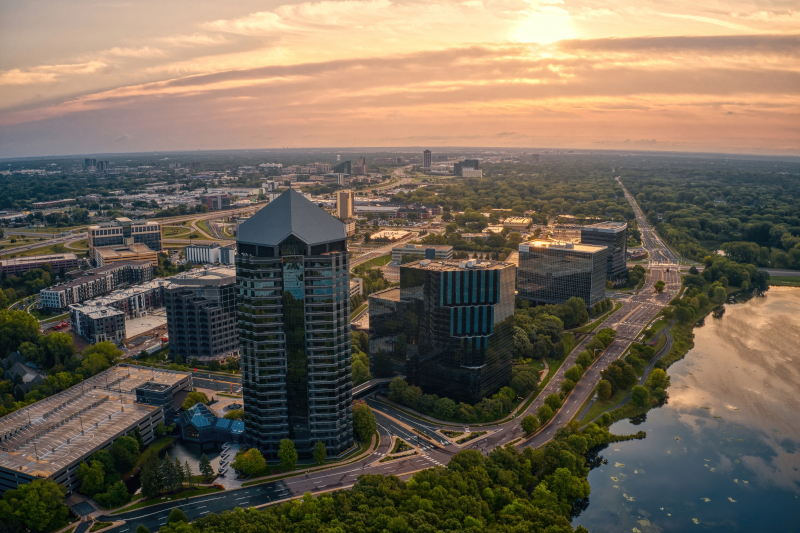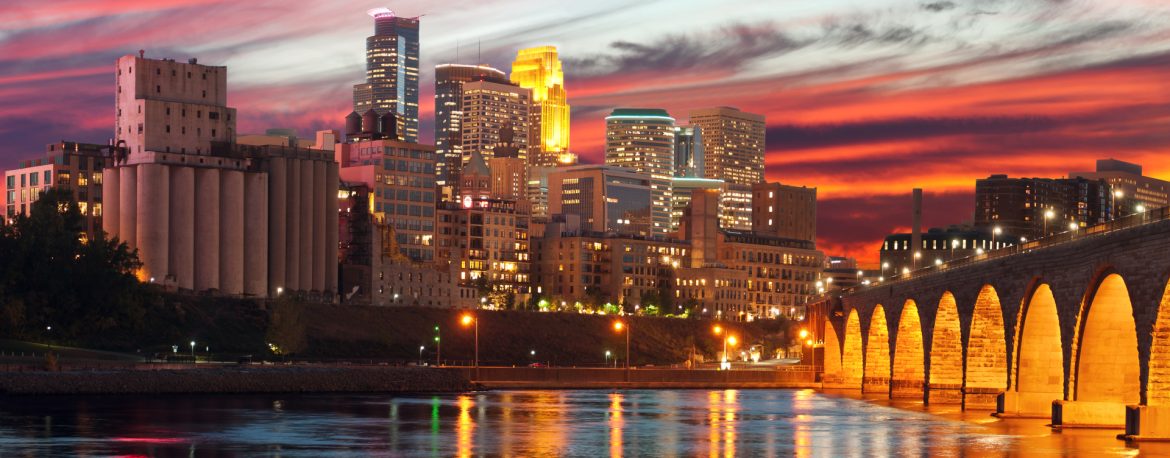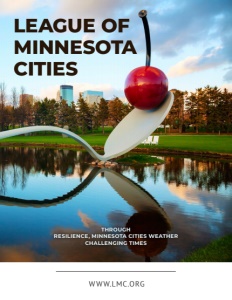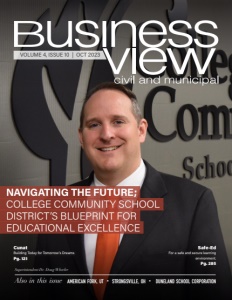League of Minnesota Cities
Through resilience, Minnesota cities weather challenging times
Fostering the efforts of Minnesota cities to prosper well into the future
Throughout Minnesota’s decades-long history, cities in our state have demonstrated resilience through tough times. Be it floods, tornadoes, or economic downturns our cities have bounced back and continued to survive and thrive. One of the ultimate tests of that resiliency, though, was the recent catastrophic outbreak of COVID-19 and its aftermath, which took its toll on the lives and health of thousands and temporarily brought our way of life to an abrupt halt.
Thanks to strong leadership from city officials, communities in our state continued to deliver vital services for their residents in a seamless fashion despite uncharted challenges posed by the pandemic and its effects. Though few individuals could have fully predicted the magnitude of the crisis, cities have navigated the storm through a mix of perseverance and innovation.
Many effects of the pandemic have passed. Yet, many remain that may permanently change the nature of local government service delivery. I am humbled to serve as the executive director for an organization with a mission of helping city governments and the great leaders that serve them, through good times and bad.
The League of Minnesota Cities is one of the largest municipal associations in the country, representing about 855 cities, large and small. Our organization is governed by a volunteer board of directors consisting of city officials from cities of all sizes and geographic locations. The League serves as an extension of our members, providing valuable information and assistance to cities through learning and training services, advocacy services, insurance coverage and risk management programs, legal and research services, and trusted personal consultation in areas from finance to communications to human resources.
 Business as usual with a mix of creativity
Business as usual with a mix of creativity
Cities in Minnesota played a special role in society’s response to the pandemic. Responsible for public safety, clean drinking water, and vital infrastructure, work in city halls and out on the streets never stopped during the shutdowns or shelter orders. Public servants stepped up to ensure public needs were met – from responding to emergency calls for help to flushing water mains, these folks kept things going in our state.
First responders and other essential staff did not experience the conveniences of working from home. They risked their own health and safety to protect ours. While essential services continued seamlessly, cities developed innovative ways to respond to governance challenges imposed by the pandemic. Most notably, city officials fully embraced technology as a means to continue meeting through periods when in-person public gatherings were restricted.
The vast majority of cities also ramped-up communication with residents to promote wellness, social distancing, masking recommendations, and vaccination opportunities within their individual communities. Communication tactics designed to reach the widest possible community audiences were put into place.
For example, the City of Brooklyn Center established a special Emergency Operations Center that focused on communication for non-English speaking residents. Similarly, the City of New Brighton recruited a Community Resource Group that identified individuals considered vulnerable and most in need of information and resources during the early days of the pandemic.
In our state as in others, COVID-19 concerns resulted in temporary closures and limited operations among retailers and other local businesses. Consequently, many merchants took a financial hit and laid-off employees due to being unable to meet payrolls.
Understanding the importance of small business, cities stepped up. As a means of financial relief, some cities—like the City of Cottonwood–were able to provide short-term grants or loans to help keep businesses afloat. Others, like the City of Eagan, temporarily waived code permits and zoning requirements to allow and fast track temporary outdoor dining and curbside pickup options for local restaurants.
And there was the City of Randall. When faced with constricted food supplies in the community, city leaders in Randall established a food library. A park building was reconfigured so people could share excess food and supplies so their neighbors could easily access them. The city was able to play a vital role connecting people to essential items in an unlocked, unstaffed park building with no reports of ransacking or vandalism. At its core, this remains a shining example of a community coming together in a time of need.
For the League’s part, because our organization is widely recognized as a vital conduit to all cities in our state we were able to establish a real-time communications channel with the Governor’s office and state agencies charged with COVID-19 education and response. Given that relationship, the League was able to provide our member cities with clarity on policies and mandates that were adopted at the state level.
We also launched a substantive COVID-19 resource area on our League web site that was updated several times a week. Memos, copies of state executive orders, and relevant fact sheets could be found there. Additionally, our research staff logged thousands of phone inquiries to provide tailored responses to frequently asked questions.
And, for several months during the pandemic, the League’s Intergovernmental Relations staff lobbied at state and federal levels to help secure relief funding for cash-strapped cities. Our research and finance staffs helped cities better understand parameters for spending the allocations.
 Residual effects of COVID
Residual effects of COVID
Though facilities have reopened since the early days of the pandemic, we haven’t returned to what we once were and we see these effects in our social and political interactions. We’ve all thought more about the proper role of government following stay-in-place and shut down mandates, as well as distancing, masking, and vaccination policies. This has led to divisions that remain today and have contributed to exaggerated political polarization in new and previously uncontentious places. Polarization continues to affect civility and order in public meetings and also contributes to a trend of increased personal harassment of local officials.
To address this trend, city officials across our state are doing their part to emphasize that work in cities is apolitical – there isn’t a republican or democrat way to fill a pothole, after all. The League partnered with a national organization known as Braver Angels to provide cities with training opportunities and other resources for addressing polarization at the local government level. The results are productive conversations in city halls about better public engagement, increased transparency, and clear standards around decorum as city business is conducted.
This work is particularly important considering the challenges cities are facing related to finding high quality candidates to run for local office and their ability to recruit and retain great employees. Generally, people who step up to serve their community care about the places they live and believe they can help make communities great places to call home. Simply put, no one wants to serve or work in an environment that is needlessly acrimonious. Cities in Minnesota provide countless examples of folks coming together to rise above the political fray that dominates much of our broader public discourse.
Today’s environment
Approximately three years after the COVID-19 outbreak, our cities remain financially solid and continue to be good places to live, work, and play. They are making unprecedented investments in the places people call home from major projects in clean water to roads and bridges, park and recreational facilities to public safety.
Due in large part to this local investment, our state consistently remains at the top of numerous quality of life rating lists. Our city governments take great pride in their welcoming neighborhoods and their exceptional provision of basic services.
Through collaboration and innovation, Minnesota communities have remained resilient through one of the biggest world crises in modern history. Whether times are tough or times are prosperous, the League of Minnesota Cities is proud of our cities and proud of our contributions to outstanding local government in our great state.
AT A GLANCE
League of Minnesota Cities
What: one of the largest municipal associations in the country, representing about 855 cities, large and small throughout Minnesota
WHERE: Minnesota, US
WEBSITE: https://www.lmc.org/


